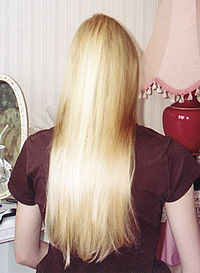- Disappearing blonde gene
-
 Blond hair is controlled by an allele recessive to most alleles responsible for darker hair, but it is not a disappearing gene
Blond hair is controlled by an allele recessive to most alleles responsible for darker hair, but it is not a disappearing gene
The disappearing blonde gene is a pseudoscientific claim that has periodically surfaced in the media since 1865.[1] The most recent[as of?] version started in 2002. According to one version, the World Health Organization, or other experts, published a report claiming that people with blond hair "will become extinct by 2202".
The story about the report was a hoax—neither the WHO nor any reputable expert has issued such a report. Those who commented on this alleged report were asked by the WHO to retract.[2]
The extinction claim is based on a misinterpretation of recessiveness in genetics. In reality, unless blondness is positively selected against, it is unlikely to become extinct, and the blond gene, or alleles for the trait, is unlikely to disappear by simple breeding.[3]
In the media
In 2002 the BBC News (and others) reported that unnamed German scientists had concluded that the natural distribution of blond hair would cease within the span of 200 years owing to the genes associated with blond hair being recessive.[4] The article stated that there is a reportedly low number of people carrying the recessive blond allele, especially in nations of mixed heritage (for example, the United States, Canada, Argentina, Chile, Brazil, New Zealand and Australia). The dominant alleles (brown hair, black hair, brown eyes) "overthrow" the recessive genes or metaphorically, endanger them. Subsequently the study was attributed to the World Health Organization.
In October 2002 The New York Times reported that the World Health Organization had no knowledge of this study.[5] [6]
The hoax died out, only to resurface in 2006 in The Sunday Times[7] and La Repubblica: "According to the WHO study, the last natural blond is likely to be born in Finland during 2202." It once again traveled quickly across the World Wide Web.[8] The hoax has also been featured on the "Threat-Down" segment of the satirical television show The Colbert Report on March 6, 2006, where Stephen Colbert suggested a selective breeding program to save blonds.
See also
- Disappearance of red hair
- Hardy-Weinberg principle
References
- ^ "Urban Legends Reference Pages: Blond Extinction". http://www.snopes.com/science/stats/blondes.asp. Retrieved 2008-01-24. Cites Chamber's journal of popular literature, science and arts By William Chambers, Robert Chambers, 1865 (p. 408), as well as newspaper mentions from 1890, 1906, and 1961. 1906 reference relates to a newspaper report on a lecture by Major C. E. Woodruff called The Disappearance of Blond Types from the American Population, mentioned in MacCurdy GG, Anthropology At The New York Meeting, Science, 26 April 1907: 653-665)
- ^ A corrected version of "Cavegirls were first blondes to have fun" by Sunday Times, February 26, 2006
- ^ Gene Expression: Golden ideas
- ^ "Blondes 'to die out in 200 years'", from the BBC, September 27, 2002.
- ^ "Hair-raising story about blonds cut short", from The Age, October 3, 2002
- ^ WHO clarification
- ^ Cavegirls were first blonds to have fun. The online version was corrected later.
- ^ "Natural blondes are likely to be extinct within 200 years" from Bit of News
Human hair color Hair color Hair coloring Blue rinse · Grecian Formula · Hair dye stripping · Hair highlighting · Henna · Hydrogen peroxide · Indian gooseberry · Juglans nigra · Senna · Blue hairOther Categories:- Hoaxes in science
- Hair color
Wikimedia Foundation. 2010.
